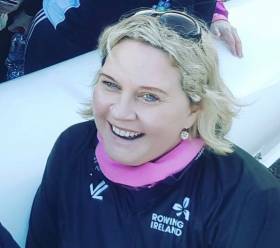Displaying items by tag: Michelle Carpenter
Carpenter to be First Woman CEO of Rowing Ireland
#Rowing: Michelle Carpenter has been chosen as the new chief executive of Rowing Ireland. She will succeed Hamish Adams who recently left the position to take up the role of CEO with Athletics Ireland.
Carpenter has held a number of significant management positions during her career, including overseeing the development and management of the successful Get Going…Get Rowing programme.
In her early corporate career, Michelle spent eight years working in Europe, firstly at the Council of Europe, Strasbourg, before moving to European Central Bank in Frankfurt in 1999 to be part of the Euro 2002 information campaign.
Originally from Limerick, Michelle was one of the first registered female rowing members of Shannon Rowing Club, rowing in their first winning women’s championship crew of 1988.
Carpenter is currently working with the World Rowing development team on the Olympic Values Education programme. In 2017 she was selected by World Rowing to be a participant at the IOC Women in Leadership forum in Lausanne.
Commenting on her new role, Carpenter said: “I am honoured to be appointed as CEO of Rowing Ireland it is an exciting time for our sport. Having been involved in Irish rowing for over 30 years, I am looking forward to contributing to the growth and success of the sport across Ireland in the future.
“I am passionate about our sport and supporting our clubs and volunteers for the future will be key to our organisation’s development, together with underpinning our successful High Performance, Get Going…Get Rowing and Coach Education programmes.
“2018 will be a very exciting year for Rowing Ireland with our international ‘Festival of Rowing’ commencing in July with the Irish Championships, leading into the Home Internationals and finishing with the prestigious Coupe de la Jeunesse.”
Commenting on the new appointment, President of Rowing Ireland, Eamonn Colclough said: “Michelle has emerged from the extremely robust and intensive recruitment process which we conducted to source the best possible candidate. I congratulate her, the first woman to be appointed to the demanding role of CEO of Rowing Ireland. I am confident that she will build on the success we have enjoyed in recent years and provide dynamic leadership to drive further growth and success in the years to come.”





























































